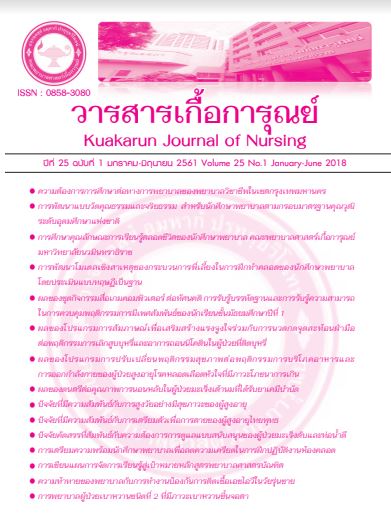ปัจจัยที่มีความสัมพันธ์กับการเตรียมตัวเพื่อการตาย ของผู้สูงอายุไทยพุทธ
คำสำคัญ:
การเตรียมตัวเพื่อการตาย, ผู้สูงอายุไทยพุทธ, ปัจจัยที่มีความสัมพันธ์บทคัดย่อ
การวิจัยนี้เป็นการวิจัยเชิงพรรณนาเพื่อหาความสัมพันธ์ระหว่างการรับรู้ภาวะสุขภาพทัศนคติต่อความตาย การสนับสนุนทางสังคม และภาวะธรรมทัศน์ในวัยสูงอายุกับการเตรียมตัวเพื่อการตายของผู้สูงอายุไทยพุทธ ที่เป็นสมาชิกชมรมผู้สูงอายุ จำนวน 100 คน ทำการสุ่มตัวอย่างแบบง่าย และปรับขนาดตามสัดส่วน จากผู้สูงอายุในชมรมผู้สูงอายุในเขตเทศบาลขิง อำเภอเมือง จังหวัดชลบุรี เครื่องมือที่ใช้ในการรวบรวมข้อมูล ประกอบด้วย แบบสอบถามข้อมูลส่วนบุคคลด้านการรับรู้ภาวะสุขภาพ แบบประเมินทัศนคติต่อความตาย แบบประเมินการสนับสนุนทางสังคม แบบประเมินภาวะธรรมทัศน์ในวัยสูงอายุ และแบบประเมินการเตรียมตัวเพื่อการตายของผู้สูงอายุไทยพุทธ วิเคราะห์ข้อมูลโดยใช้สถิติร้อยละ และสัมประสิทธิ์สหสัมพันธ์ ของ เพียร์สัน ค่าสัมประสิทธิ์ความเชื่อมั่นของเครื่องมือเหล่านี้เท่ากับ .89, .80, .80, .91 และ. 81 ตามลำดับ
ผลการวิจัยพบว่า ผู้สูงอายุไทยพุทธมีคะแนนการเตรียมตัวเพื่อการตาย คิดเป็นร้อยละ 88.2 ทัศนคติต่อความตาย และภาวะธรรมทัศน์ในวัยสูงอายุ มีความสัมพันธ์ทางบวกกับการเตรียมตัวเพื่อการตายในระดับปานกลาง (r = .36 และ = .34, p < .01) การรับรู้ภาวะสุขภาพมีความสัมพันธ์ทางลบกับการเตรียมตัวเพื่อการตายในระดับปานกลาง (r = -.33, p < .01) ส่วนการสนับสนุนทางสังคมไม่มีความสัมพันธ์กับการเตรียมตัวเพื่อการตาย

















